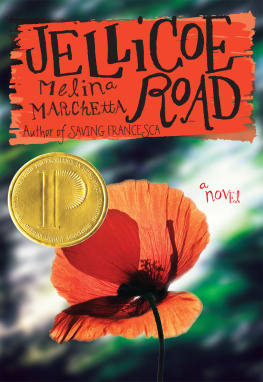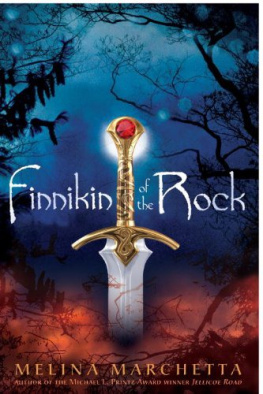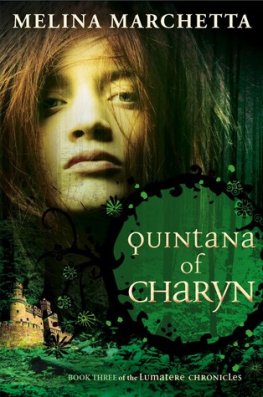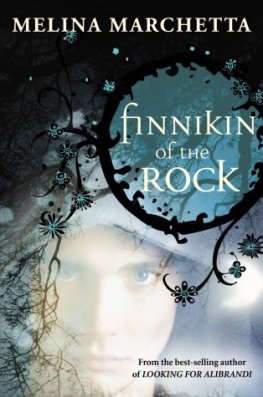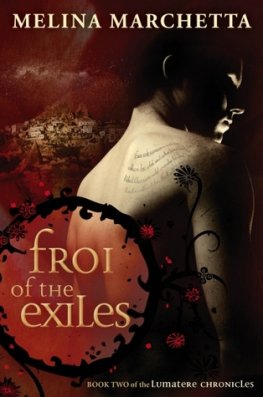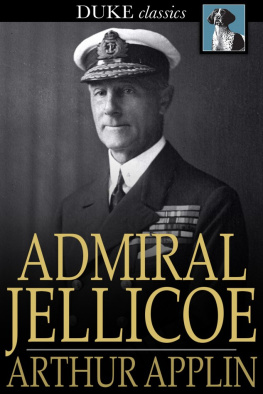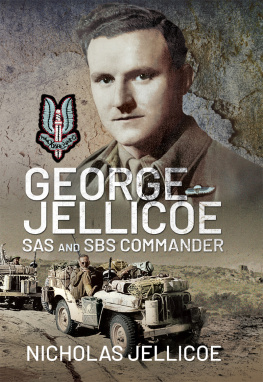My father took one hundred and thirty-two minutes to die.
I counted.
It happened on the Jellicoe Road. The prettiest road Id ever seen, where trees made breezy canopies like a tunnel to Shangri-la. We were going to the ocean, hundreds of miles away, because I wanted to see the ocean and my father said that it was about time the four of us made that journey. I remember asking, Whats the difference between a trip and a journey? and my father said, Narnie, my love, when we get there, youll understand, and that was the last thing he ever said.
We heard her almost straightaway. In the other car, wedged into ours so deep that you couldnt tell where one began and the other ended. She told us her name was Tate and then she squeezed through the glass and the steel and climbed over her own deadjust to be with Webb and me; to give us her hand so we could clutch it with all our might. And then a kid called Fitz came riding by on a stolen bike and saved our lives.
Someone asked us later, Didnt you wonder why no one came across you sooner?
Did I wonder?
When you see your parents zipped up in black body bags on the Jellicoe Road like theyre some kind of garbage, dont you know?
Wonder dies.
TWENTY-TWO YEARS LATER
Im dreaming of the boy in the tree and at the exact moment Im about to hear the answer that Ive been waiting for, the flashlights yank me out of what could have been one of those perfect moments of clarity people talk about for the rest of their lives. If I was prone to dramatics, I could imagine my sighs would have been heard from the boundaries of the school to the town down below.
The question begs to be asked, Why the flashlights? Turning on the light next to my bed would have been much less conspicuous and dramatic. But if there is something I have learned in the past five years, its that melodrama plays a special part in the lives of those at the Jellicoe School. So while the mouths of the year twelves move and their hands threaten, I think back to my dream of the boy, because in it I find solace. I like that word. Im going to make it my word of the year. There is just something about that boy that makes me feel like I belong. Belong . Long to be . Weird word, but semantics aside, it is up there with solace .
Somewhere in that hazy world of neither here nor there, Ill be hanging off that tree, legs hooked over the branch, hands splayed, grabbing at air that is intoxicating and perfumed with the sweet smell of oak. Next to me, always, is that boy. I dont know his name, and I dont know why he comes calling, but he is there every time, playing the same music on one of those Discmans for tapes from the eighties, a song about flame trees and long-time feelings of friends left behind. The boy lets me join in and I sing the same line each time. His eyes are always watery at that point and it stirs a nostalgia in me that I have no reason to own, but it makes me ache all the same. We never quite get to the end of the song and each time I wake, I remind myself to ask him about those last few bars. But somehow I always forget.
I tell him stories. Lots of them. About the Jellicoe School students and the Townies and the Cadets from a school in Sydney. I tell him about the war between all three of us for territory. And I tell him about Hannah, who lives in the unfinished house by the river at the edge of the Jellicoe School, and of the manuscript of hers Ive read, with its car wreck. Hannah, who is too young to be hiding away from the world and too smart to be merely organising weekend passes for the kids in my dorm. Hannah, who thinks she has me all worked out. I tell him of the time when I was fourteen, just after the Hermit whispered something in my ear and then shot himself, when I went in search of my mother, but got only halfway there. I tell him that I blame the Cadet for that.
The boy in the tree sobs uncontrollably when I tell him about the Hermit and my mother, yet his eyes light up each time I mention Hannah. And every single time he asks, Taylor, what about the Brigadier who came searching for you that day? Whatever became of him? I try to explain that the Brigadier is of no importance to my story, that the Brigadier was just some top brass, high up in the army, who had been invited to train the cadets that year, but the boy always shakes his head as if he knows better.
And there are times, like this time, when he leans forward to remind me of what the Hermit had whispered. He leans so far forward that I catch his scent of tea-tree and sandalwood and I strain my ears to listen so I will never forget. I strain my ears, needing to remember because somehow, for reasons I dont know, what he says will answer everything. He leans forward, and in my ear he whispers
Its time!
I hesitate for a moment or two, just in case the dream is still floating around and I can slip back into it for that crucial moment. But the flashlights hurt my eyes and when Im able to push them away I can see the ignorant impatience in the faces of the year twelves.
If you want us to scare you, Taylor Markham, well scare you.
I climb out of bed and pull on my jumper and boots and grab my inhaler. Youre wearing flannelette, I remind them flatly. How scared should I be?
They walk me down the corridor, past the senior rooms. I see the other year-eleven girls, my classmates, standing at their door, watching me. Some, like Raffaela, try to catch my eye, but I dont allow it to hold. Raffaela makes me feel sentimental and there is no place in my life for sentimentality. But for just one moment I think of those first nights in the dorm five years ago, when Raffaela and I lay side by side and she listened to a tale that I have no memory of today about my life in the city. Ill always remember the look of horror on her face. Taylor Markham, she had said, Im going to say a prayer for you. And although I wanted to mock her and explain I didnt believe in anything or anyone, I realised that no one had ever prayed for me before. So I let her.
I follow the seniors down two flights of stairs to a window that is supposedly the least conspicuous one in the House. I have actually mastered the climb down from my own window but have never dared to tell anyone. It gives me more freedom and means that I dont have to explain my every move to the year-seven spies in the dorm. I started off as one of those. They hand-pick you young out here.
A thorn presses into my foot through the soft fabric of my boot and I let it for a moment, pausing until they push me forward. I walk ahead, allowing them to play out their roles.
The trail that leads to the meeting hut is only distinguishable in the pitch black by the sensation of soft dirt under my feet. In the darkness, one of the seniors stumbles behind me. But I keep on walking, my eyes closed, my mind focused. Ever since they moved me from the communal dorms to my own room in year seven I have been trained to take over, just like the protgs in the other Houses. Five years is a long time waiting and somehow during that time I got bored. So as we reach the hut and enter and I feel the waves of hostility smack me in the face, I begin to plan my escape from Jellicoe. Except that this time I will not be fourteen and there wont be a Cadet who tags along. There will just be me. According to Dickens, the first rule of human nature is self-preservation and when I forgive him for writing a character as pathetic as Oliver Twist, Ill thank him for the advice.
Candles illuminate the canvas-covered dirt floor where the seniors from all the Houses sit with their successors, waiting for the verdict.
This is officially the passing-on ceremony, the one-in-charge says. You keep it simple. Its not a democracy. Whoevers in charge rules. They can only be superseded if five of the six House leaders sign a document deeming him or her incompetent. The one-in-charge has final say in what gets traded with the Cadets and the Townies. He or she, only, has the right to surrender to the enemy.

